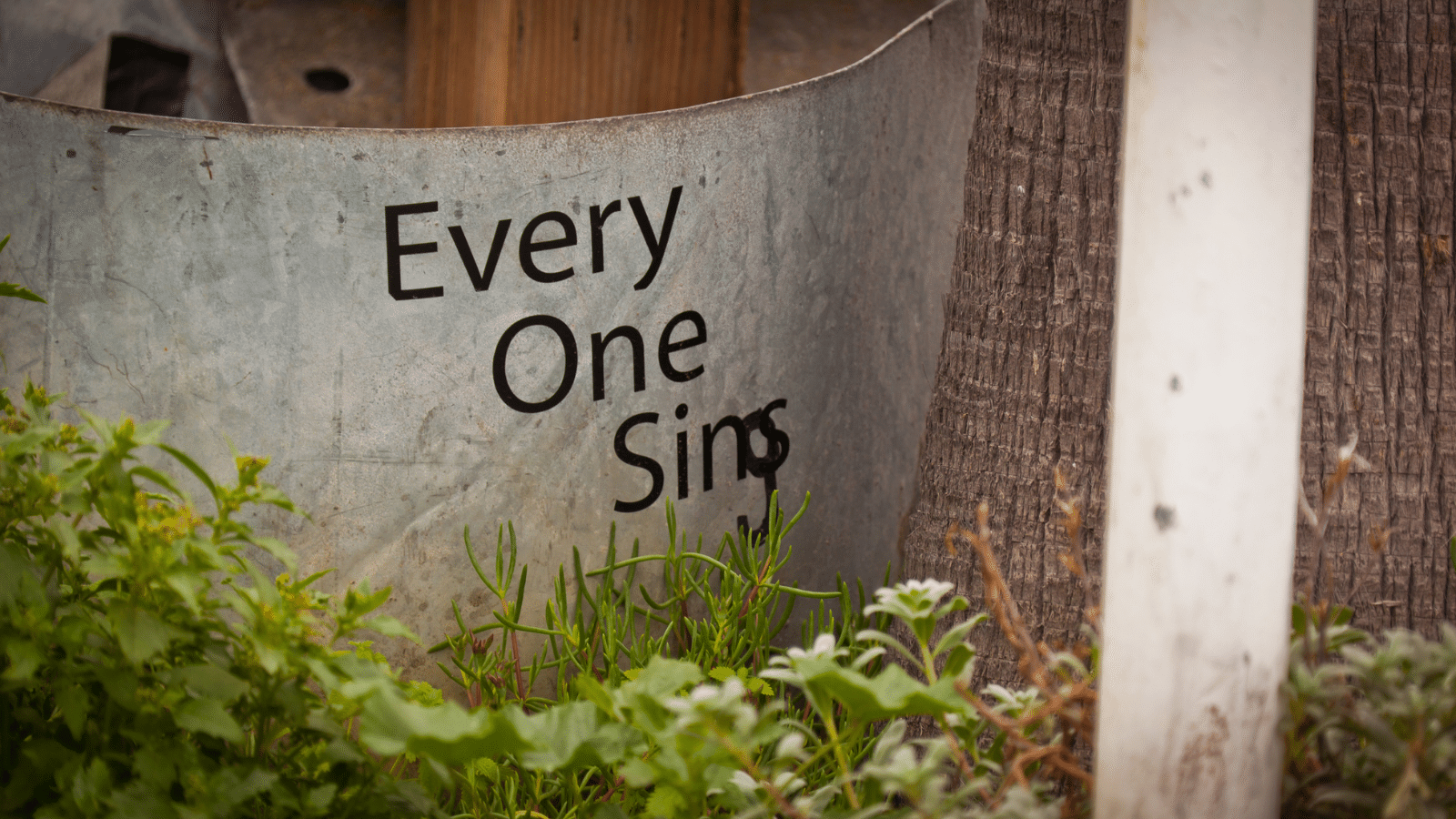Contrary to Popular Belief, Christians SHOULD Judge. Here’s Why.
Isn’t the world a better place when we stop judging and all just get along? Well, yes and no. Many people love to use the popular phrase “Who am I to judge?” Maybe you’ve used it too?
If so, you may have assumed that this popular Bible verse means that people (or Christians specifically) shouldn’t judge other people. Unfortunately, this isn’t quite what this verse means.
Contrary to popular belief, the Bible actually says Christians should judge. Here’s what the Bible says on the matter, why Christians should judge others (at times), and why you probably should too.
The Difference Between “Judge” and “Judgmental”

First of all, it’s important to understand that there’s a big difference between “judging” and being “judgmental.”
According to the Merriam-Webster online dictionary, the verb “judge” means “to form an opinion about through careful weighing of evidence.” In other words, to “judge” something, simply means to determine if it is right, good, or fair.
However, the Merriam-Webster online dictionary defines the adjective “judgmental” this way: characterized by a tendency to judge harshly.
In this article, we aren’t talking about being judgmental (which we can all agree is bad), but about judging people fairly.
The Bible Doesn’t Say, “Do Not Judge”

While the Bible does contain the phrase, “Do not judge,” this verse is often taken out of context, completely distorting its meaning.
Here’s the verse in context:
“Do not judge, or you too will be judged. For in the same way you judge others, you will be judged, and with the measure you use, it will be measured to you.
Why do you look at the speck of sawdust in your brother’s eye and pay no attention to the plank in your own eye? How can you say to your brother, ‘Let me take the speck out of your eye,’ when all the time there is a plank in your own eye? You hypocrite, first take the plank out of your own eye, and then you will see clearly to remove the speck from your brother’s eye.” — Matthew 7:1-5
In this passage, Jesus isn’t saying that people should never judge. Rather, he’s saying: Be very careful when you judge, because God will hold you to the same standard.
We can see this because Jesus doesn’t say, “Don’t worry about the plank in your brother’s eye. Worry about yourself.”
Rather, Jesus says, “Take care of yourself first, and then you can help your brother.”
Bible Verses that Tell Christians TO Judge

Don’t believe the Bible says Christians should judge?
While you won’t find any verses telling Christians to be judgmental, Scripture is full of verses that tell us to judge wisely.
For example:
- “Do not judge by appearances, but judge with right judgment.” –John 7:24
- “The person with the Spirit makes judgments about all things…” –1 Corinthians 2:15
- “Open your mouth, judge righteously, defend the rights of the poor and needy.” –Proverbs 31:9
- “Beloved, do not believe every spirit, but test the spirits to see whether they are from God.” –1 John 4:1
- “If your brother or sister sins, go and point out their fault, just between the two of you…” –Matthew 18:15
What Would Happen if No One Judged (Ever)?

Ever wish you could live in a world where no one judged — ever? Not for long…
While it would be nice to live in a world without judgmental people, we need to be able to fairly and justly judge those around us — both our friends and family members as well as other members of society.
If we lived in a world where no one judged anyone:
- We would have to elect our political leaders at random since we couldn’t determine who would be most qualified.
- All of our society’s dangerous criminals would roam free because we couldn’t judge whether their actions were right or wrong.
- We’d have to choose our spouses and friends at random too, since we couldn’t judge their character.
- We would have to let our babies run with scissors since we couldn’t judge that the situation might be dangerous for them.
- We would have to let our children run off with dangerous creeps since we couldn’t judge their ill intentions.
Sometimes, Judging is the Loving Thing to Do

If you had a friend or family member clearly making terrible choices that would harm themselves or others, wouldn’t you want to say something? What if someone else was hurting someone you loved? Wouldn’t you want to speak up?
For example, what if your loved one had a drug addiction that prevented them from caring for their children? What if they had an eating disorder or mental health disorder that was slowly taking their once-vibrant life away?
While every human being has free will and a right to decide, sometimes we all need people in our lives brave enough to tell us when we’re making dumb choices and headed down the wrong path. The choice is ultimately ours, but sometimes we don’t realize how bad things are until someone else is willing to speak up in love.
Are You Too Judgmental?

That being said, while we do want to judge wisely, we don’t want to fall into the trap of being judgmental, or unfairly criticizing others because they’re making choices other than the ones we want them to make.
Here are a few questions to ask yourself to determine if you’re too judgmental:
- Does it make you uncomfortable when others make choices you don’t agree with?
- Does it make you angry or uncomfortable when others believe differently than you?
- Do you frequently offer unsolicited advice or feedback?
- How is your advice received? Do others appear receptive, or do they appear uncomfortable or defensive?
- Do you become upset when others don’t follow your advice?
If you find yourself frequently commenting on others’ lives — especially the lives of people you barely know — you may have crossed the line from right judgment into being judgmental.
How to Stop Being Judgmental: 1. Pay Attention

Because judgmental attitudes can often start from a place of caring or from a passion for certain values, you might not even realize just how judgmental you’re being.
This is why, the FIRST thing you need to do is to start paying attention to the behavior, noticing when you act judgmental, and looking for patterns.
- Are there certain people or types of people you tend to be more judgmental of? (Perhaps a certain race, income level, profession, disability, hobby or interest?)
- Are there specific places or situations where you tend to be more judgmental? (Maybe at church, school, volunteer opportunities, or people in the media?)
- What specific negative thoughts are popping into your head?
See Also: Are All Sins Equal to God?
2. Challenge Your Thoughts and Beliefs

Once you have been able to pinpoint exactly which people or situations tend to trigger judgmental thoughts for you, it’s time to challenge the validity of these judgments to see how much weight they hold. (Probably not much).
For example:
- Are all (people of a certain race) really (negative attribute)?
- Are all (people who voted differently than I did) really (negative attributes)? Every single one of them? Or is it possible they simply see the world a different way, due to their unique priorities and life experiences?
- Is she really a terrible person, or is it possible she just holds a different belief than me on this one point, for reasons I may not understand yet?
See Also: How to Renew Your Mind in Christ
3. Give the Benefit of the Doubt

It can also be incredibly helpful to get in the habit of giving others the benefit of the doubt.
In other words, when you see others making a mistake/sinning/failing, etc… Instead of condemning them for their sin (even though you don’t have all the information), you choose to believe that they are a work in progress and that there are factors you don’t know.
For example:
- For the woman with the out-of-control kids at church: “She’s probably doing her best. Maybe something happened at home. Maybe the kids are struggling with things I don’t know about.”
- For someone who seems to have no ambition/motivation: “Maybe they gave it their all, and nothing worked out through no fault of their own. Maybe there is nothing more they can do right now, so they are waiting.”
- For someone who is extremely rude to others: “Maybe they have a very deep hurt I know nothing about. Maybe they never had positive role models to look up to. Maybe something is going on that is causing them extra stress.”
See Also: 60 Bible Verses About Loving Others
4. Remember Your Own Faults

There’s a reason Jesus tells us, “…first take the plank out of your own eye, and then you will see clearly to remove the speck from your brother’s eye” in Matthew 7:1-5.
When we pause long enough to consider our own faults and failures, it reminds us that we’re all works in progress, none of us is perfect, and we all need God’s grace.
Yes, there is a time to confront. But there’s also a time to worry about your own sins and shortcomings instead. This is something we could all use more of!
See Also: What is Righteousness in the Bible?
5. Choose to Deliberately Think Positive Thoughts

Unfortunately, sometimes we get so used to thinking negative thoughts about certain people, that we start to do it without even realizing it.
That’s why it’s SO important to take step #1 above and recognize our behavior. And THEN also deliberately choose to replace our negative thoughts with positive ones.
For example:
- Instead of thinking, “She’s wearing that to church??” choose to think, “I’m so glad she could make it today!”
- Instead of thinking, “Wow, he’s overweight,” choose to notice something nice about his appearance or personality. (Bonus points if you tell them!)
- Instead of thinking, “Why is she so obsessed with her stupid home business?” choose to think, “That’s so great that she found something she’s so passionate about!”
7 “Sins” the Bible Never Actually Prohibits

If you grew up in a conservative Christian household (like I did!), you may have learned that some actions weren’t appropriate for Christians.
For example, I was definitely taught that “you don’t smoke, drink, cuss, gamble, or spend time with those who do.”
Imagine my surprise, then, when — as an adult — I learned that not all Christians find all of these actions (or others) wrong in the slightest!
No matter your personal preference (and I still prefer not to do most of these things myself), here are 7 things the Bible never actually prohibits as sin.
7 “Sins” the Bible Never Actually Prohibits
Oops! These 10 Popular Bible Verses Don’t Mean What You Think

Unfortunately, these issues are far from the only ones Christians and non-Christians often misunderstand.
Here are 10 popular Bible verses people love to take out of context, completely distorting their original meaning in the process.
Oops! These 10 Popular Bible Verses Don’t Mean What You Think
10 Commonly Accepted “Biblical” Truths You Won’t Find Anywhere in the Bible

Want even more Bible misconceptions? There are tons of them out there!
From Eve and the apple to Jonah and the whale, you might just be surprised to find out the Bible doesn’t include the details you think it does!
Here are 10 Commonly accepted “Biblical” truths you won’t find anywhere in the Bible.
Are Tattoos a Sin? Here’s What the Bible Says

What does the Bible say about tattoos?
Surprisingly, very little.
There’s only one verse in the entire Bible that even mentions tattoos (Leviticus 19:28), and it isn’t as straightforward as it initially appears.
So whether your body is covered in Christian tattoos or you’re considering getting your very first Bible tattoo…
If you’re wondering, “Are tattoos a sin?” or “Can we go to Heaven with tattoos?” this post has everything you need to know.
What Does the Bible Say About Tattoos? Are Tattoos a Sin?
Incredibly Common Sins You May Not Know You’re Committing Right Now

Did you know you could be committing sins right now?
As defined by various religious and moral traditions, Sins are actions or behaviors considered morally wrong or offensive. While many people are familiar with the more well-known sins like lying, stealing, or greed, there are several lesser-known sins that people may not realize they’re committing.
Incredibly Common Sins You May Not Know You’re Committing Right Now







